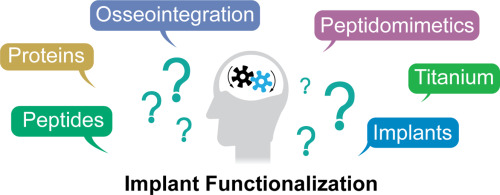当前位置:
X-MOL 学术
›
Adv. Colloid Interface Sci.
›
论文详情
Our official English website, www.x-mol.net, welcomes your
feedback! (Note: you will need to create a separate account there.)
Proteins, peptides and peptidomimetics as active agents in implant surface functionalization.
Advances in Colloid and Interface Science ( IF 15.9 ) Pub Date : 2019-12-13 , DOI: 10.1016/j.cis.2019.102083 Przemysław Jurczak 1 , Julia Witkowska 1 , Sylwia Rodziewicz-Motowidło 1 , Sławomir Lach 1
Advances in Colloid and Interface Science ( IF 15.9 ) Pub Date : 2019-12-13 , DOI: 10.1016/j.cis.2019.102083 Przemysław Jurczak 1 , Julia Witkowska 1 , Sylwia Rodziewicz-Motowidło 1 , Sławomir Lach 1
Affiliation

|
The recent impact of implants on improving the human life quality has been enormous. During the past two decades we witnessed major advancements in both material and structural development of implants. They were driven mainly by the increasing patients' demand and the need to address the major issues that come along with the initially underestimated complexity of the bone-implant interface. While both, the materials and design of implants reached a certain, balanced state, recent years brought a shift in focus towards the bone-implant interface as the weakest link in the increasing implant long-term usability. As a result, several approaches were developed. They aimed at influencing and enhancing the implant osseointegration and its proper behavior when under load and stress. With this review, we would like to discuss the recent advancements in the field of implant surface modifications, emphasizing the importance of chemical methods, focusing on proteins, peptides and peptidomimetics as promising agents for titanium surface coatings.
中文翻译:

蛋白质,肽和拟肽在植入物表面功能化中作为活性剂。
植入物最近对改善人类生活质量的影响是巨大的。在过去的二十年中,我们见证了植入物在材料和结构开发方面的重大进步。它们主要是由于患者需求的增长以及需要解决的主要问题,而这些问题是最初被低估的骨植入物界面的复杂性。尽管植入物的材料和设计都达到了一定的平衡状态,但近年来,作为增加植入物长期可用性的最薄弱环节,人们将注意力转向了骨-植入物界面。结果,开发了几种方法。他们的目的是在负载和压力下影响和增强植入物的骨整合及其适当的行为。有了这篇评论,
更新日期:2019-12-17
中文翻译:

蛋白质,肽和拟肽在植入物表面功能化中作为活性剂。
植入物最近对改善人类生活质量的影响是巨大的。在过去的二十年中,我们见证了植入物在材料和结构开发方面的重大进步。它们主要是由于患者需求的增长以及需要解决的主要问题,而这些问题是最初被低估的骨植入物界面的复杂性。尽管植入物的材料和设计都达到了一定的平衡状态,但近年来,作为增加植入物长期可用性的最薄弱环节,人们将注意力转向了骨-植入物界面。结果,开发了几种方法。他们的目的是在负载和压力下影响和增强植入物的骨整合及其适当的行为。有了这篇评论,









































 京公网安备 11010802027423号
京公网安备 11010802027423号